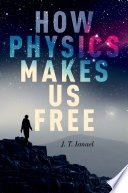
How physics makes us free
The overarching theme of this book is that physics does not tell us that we are not free. Most philosophical books on free will start by saying “physics tells us that all of our actions are determined by fundamental laws of nature (perhaps with some quantum randomness thrown in.” Built around these simple remarks is a highly articulated landscape of philosophical responses to the challenge physics is supposed to present to human freedom. I am hoping that this book can fill a lacuna in this landscape by giving a much more adequate account of “what physics tells us”: that is, the parts that are settled and the parts that are unsettled, how much we understand about our place in the universe, and how physics has come to view notions like space, time, causation, and law. These are all directly and deeply implicated in the stark opposition implicit in those simple pronouncements about what science tells us about human freedom. The book is organized into two parts. The first is addressed to questions of what we (our selves) are and how we fit into the natural order. The second turns to the difficulty of locating our actions in the natural order. It addresses the central philosophical arguments that are meant to undermine the prephilosophical view of those actions as free.
Oxford University Press
New York
